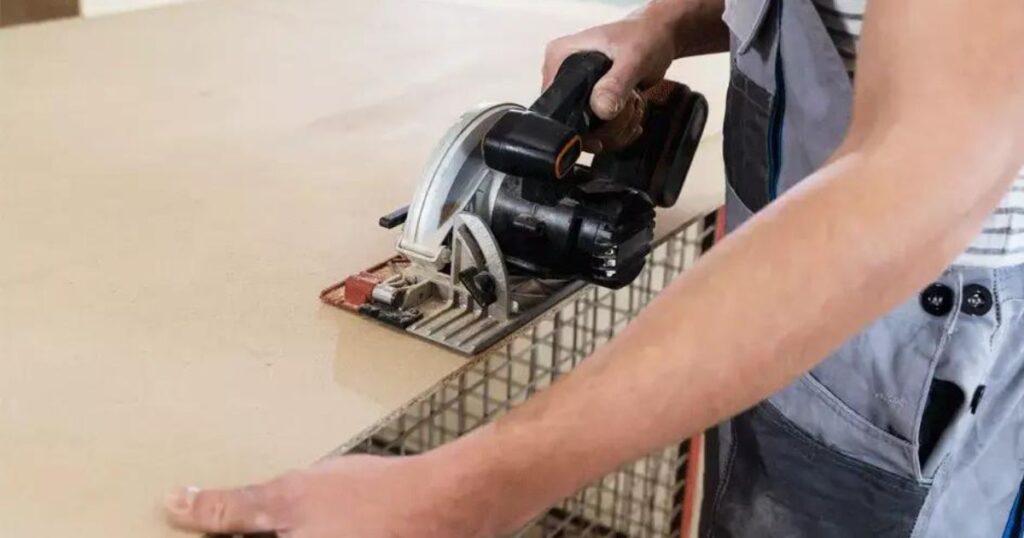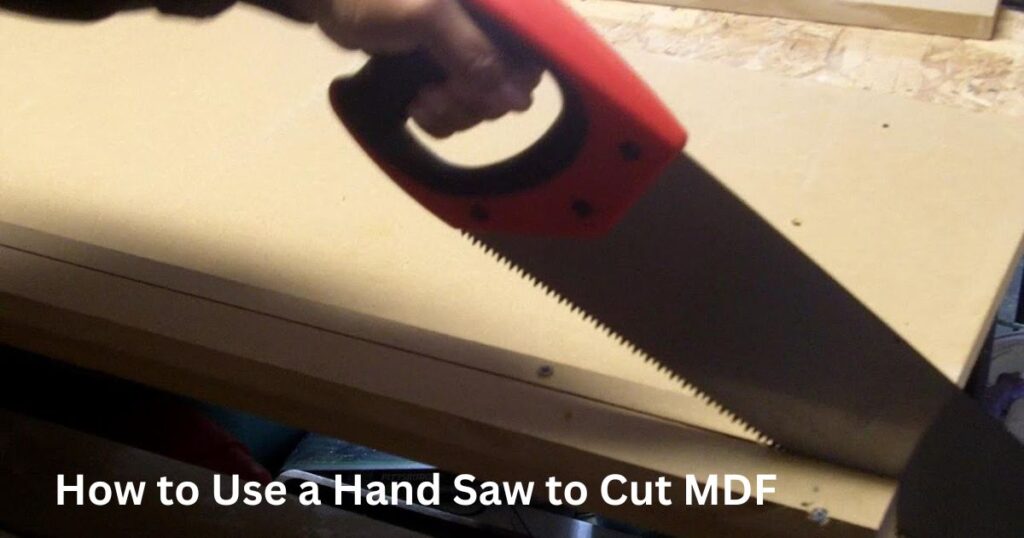Hardboard called medium-density fiberboard (MDF) is often used to make cabinets and other things inside. You can even see landscapers using it and buy it from more than two gardening stores that sell wood goods.
The man-made material is made by pressing together wood fibers that are mixed with a synthetic resin. It comes in sheets 4 or 5 by 8 feet, the same size as plywood, and their widths range from 3/8 inch to 1 inch.
Medium Density Fiberboard (MDF) can be cut with any wood-cutting tool. However, the right tool should be picked based on how the MDF is made. Besides this, you need to take some safety measures.
When taken in, MDF dust can be very bad for the lungs at first.
Lucky for you, our guide will discuss the most common question “Can You Cut MDF With a Table Saw?” You don’t need a Ph.D. to cut medium-density fiberboard (MDF) in a straight line.
How to Cut MDF Using a Table Saw:

Your table saw can cut MDF the same way it cuts other kinds of wood. If you have a table saw, this is the fastest way to cut MDF.
You can use both sides of the MDF if you put it on the outside of the saw blade. Let’s say you want to cut a 12-inch wide board of wood. The fence on your table saw can be changed to be 11 ½ inches wide.
Next, turn your MDF over and put it through the machine once more to make another 11 ½-inch board. You will be able to get the most out of the board that way.
Read through all of the safety rules before you start cutting with a table saw. Do not skip this step because table saws are dangerous.
Step 1)Place the Blade on the Table Saw:
Place the MDF on the table saw so that the blade is higher than the MDF. The blade can fully cut through the MDF if it is about 1/16 of an inch above it.
Step 2) Set the Table Saw Fence:
Place the fence so that it lines up with the piece of work. This lets the gauge move along the fence as you cut, which keeps the last ends of your cut piece from coming apart.
Step 3)Cut the First Piece:
Slowly move the board toward the blade and start cutting. Leave two inches of space between the piece and the cut you want to make. After each cut, you’ll need this room to cut off the chipping around the edge of your board.
Step 4) Examine the Item for Chips or Rough Edges:
Check the sides and bottom of the board for rough edges or chips after each cut. For sure, you can touch the edges. Do you have any rough spots? Cut them off with a table saw or sandpaper to make them smooth.
If you need to make a lot of cuts, a table saw is the best way to do it. MDF is also known as a hardboard. Moving quickly between cuts is easy once you know your angles and where you are.
Is Cutting MDF Safe?
Here’s some more information on how to cut MDF safely. It can be from your safety in the woods.
1)Straight Cuts:
You can make straight cuts or rip cuts in MDF with any circle saw or hand-held cutting tool. However, because the material has a lot of glue, the blade should have a carbide tip.
More teeth on the blade make it less likely to chip, but it also makes more dust. A table saw is used to cut MDF, but it should have a vacuum system built in so that dust doesn’t get in the way of the motor or your air.
2)Cuts with Curves:
A jigsaw can cut MDF just as easily as plywood, but the more teeth the blade has, the less likely it is that the material around the cut edges will get chipped. In a sensitive cut, a steel-cutting blade will keep the edges whole.
To cut curves and holes in MDF, you can also use a hand-held or rotary tool with a blade that can do more than one thing. This is an option when a plunge cut needs to be made in MDF cabinets that are already put together.
3)Holes:
To make holes up to 1 1/2 inches in diameter in MDF, use a drill with a regular drill bit or a spade bit. To make holes up to 4 inches in diameter, use a hole saw.
To make bigger holes or holes that aren’t round, drill into the sides of the outline and then use a jigsaw to cut around it.
Use a hand-held or rotary tool with a multi-purpose cutting blade. Carefully cut around the shape with the tool while inserting the blade into it.
4)Routing:
Any router bit that can route through wood can also route through MDF, but steel bits will wear out faster than carbide-tipped blades like a carbide straight flute bit.
You can also use a hand-held utility tool with a routing attachment. When routing MDF, a lot of dust is made, which is not good for you.
Because it’s smaller than a normal router, you can see your work better and handle it more easily. When you are routing, you should always move the carbide flute bit against the spinning of the blade. If you don’t, it will spin out of control and damage the edge.
Before you use your carbide straight flute bit to cut in your complex patterns or edges, make sure the piece is locked in place on your router table or workbench.
How to Use a Hand Saw to Cut MDF:

Cutting MDF with a hand saw is the traditional way to do it. This can take a long time and be hard to do if you need to cut a lot of MDF. A hand saw, on the other hand, is cheap and easy to get.
A hack saw can be used to make rough cuts. It is best to use a good coping saw for more accurate cuts.
- Put the MDF board on a desk or another flat surface.
- Draw a line across the board’s face with a pencil.
- Fix a straight edge, like a ruler, to the board next to this line in a way that won’t get in the way of the saw. Because of this, the blade will also not turn.
- Place the saw’s blade against the edge of the board so that it lines up with the mark. It’s important to start the cut completely straight since any flaw could mess up the whole thing.
- To get the teeth into the board, start the cut at a sharp angle on both sides. After making a path deep enough for the blade to follow, slowly lower it.
- To keep the cut straight, keep cutting while pushing the blade along the edge that is fixed.
- Support the hanging end of the board so it doesn’t break off once you’re halfway down the cut. Then, go a little slower to cut go smoothly.
Tips:
When using a hand saw to cut wood, it’s important to cut right along the line. If you’re not careful, the edge will be uneven, and you might need to cut that part again.
To cut at an angle with a handsaw, first lift the cutting part off the wood and then lower it onto the wood to start the cut. This will keep the wood from backing up when you use your hand saw.
Bottom Line: Can You Cut MDF With a Table Saw?
To sum up, cutting MDF is generally a simple process. You will need to be careful if you want to make clean, exact cuts that don’t chip. We’ve learned a lot about how to cut MDF sheets on our own by following some simple steps in this blog.
We now know that there are different ways to cut MDF boards, but we need to be careful and protect ourselves. No more worrying about how to cut an MDF piece straight. Never forget that your safety comes first.
FAQs about Can You Cut MDF With a Table Saw?
Which Machine Cuts MDF the Best?
Since the CNC laser cutting machine came out, it has changed the way things are made. Because they are accurate, fast, and flexible, these tools are essential in many fields. Cutting things like MDF, plywood, and other wood-based items is one of the most popular methods used.
How Can I Cut MDF Without Getting Hurt?
Use a steel blade and a TPI of at least 20 to cut the MDF. When cutting MDF, you should always wear safety gear. Putting a mask over your mouth and safety glasses over your eyes will keep dust and dangerous chemicals from the MDF from getting into your eyes.
Does MDF Cut Better than Plywood?
If you want to do a job yourself, MDF is easier to cut straight than plywood. It won’t split or crack along the edges because it’s soft and doesn’t have any wood grain, even if you carve curves, ridges, sharp angles, or other complicated trim. Because plywood has rough edges, it can’t be cut in fancy ways.
Related Posts:
